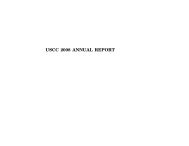Tracking GhostNet: Investigating a Cyber ... - Nart Villeneuve
Tracking GhostNet: Investigating a Cyber ... - Nart Villeneuve
Tracking GhostNet: Investigating a Cyber ... - Nart Villeneuve
You also want an ePaper? Increase the reach of your titles
YUMPU automatically turns print PDFs into web optimized ePapers that Google loves.
JR02-2009 <strong>Tracking</strong> <strong>GhostNet</strong> - PART ONE<br />
11<br />
Context and background: Alleged Chinese operations<br />
in cyberspace<br />
China has been developing its cyberspace doctrine and capabilities since the late 1990s as part of its military<br />
modernization programme. The Chinese doctrine of ‘active defence,’ which is the belief that China must be ready<br />
to respond to aggression immediately, places an emphasis on the development of cyber warfare capabilities.<br />
The Chinese focus on cyber capabilities as part of its strategy of national asymmetric warfare involves<br />
deliberately developing capabilities that circumvent U.S. superiority in command-and-control warfare.<br />
The strategy recognizes the critical importance of the cyber domain to American military and economic<br />
power and the importance of offensive cyber operations to victory in a modern conflict with the United<br />
States. Chinese doctrine also emphasizes the contiguity between military and non-military realms. 17<br />
In recent years, there has been an increase in allegations that China-based hackers are responsible for<br />
high-level penetrations of computer systems in Europe, North America and Asia. Attackers originating<br />
in China have been accused of infiltrating government computers in the United States, Britain, France,<br />
Germany, South Korea, and Taiwan. China-based hackers have been accused of data theft from foreign<br />
government computers and commercial and financial institutions. The U.S. Department of Defense<br />
reports it is continuously targeted by Chinese attackers, most notably in the series of attacks since 2003<br />
known as ‘Titan Rain,’ which targeted the Department of Defense and numerous defence companies. 18<br />
There are also allegations of attacks originating from China directed against non-governmental<br />
organizations active in regions where China has a national interest. This includes organizations<br />
advocating on the conflict in the Darfur region of Sudan, 19 Tibetan groups active in India, and the<br />
Falun Gong. The majority of attacks involve website defacements, denial of service attacks, or virus<br />
writing campaigns. Nationalistic and patriotic cyber-activity by Chinese nationals intensifies during<br />
crises, such as during Sino-American or Sino-Taiwanese tensions (see below). To date none of these<br />
attacks have been traced back to Chinese state authorities or specific individuals, although many<br />
have benefited official Chinese policy and interests.<br />
17 http://findarticles.com/p/articles/mi_m0PBZ/is_6_88/ai_n31140190 ; http://www.infowar-monitor.net/modules.phpop=modload&na<br />
me=Archive&file=index&req=viewarticle&artid=2&page=1 ; http://www.heritage.org/Research/asiaandthepacific/upload/bg_2106.pdf<br />
18 http://www.time.com/time/magazine/article/0,9171,1098961,00.html ; http://findarticles.com/p/articles/mi_m0PBZ/is_6_88/<br />
ai_n31140190 ; http://www.afa.org/media/reports/victorycyberspace.pdf<br />
19 http://www.insidetech.com/news/articles/1630-mysterious-forces-hack-pro-tibet-save-darfur-sites ; http://www.washingtonpost.<br />
com/wp-dyn/content/article/2008/03/20/AR2008032003193.html















